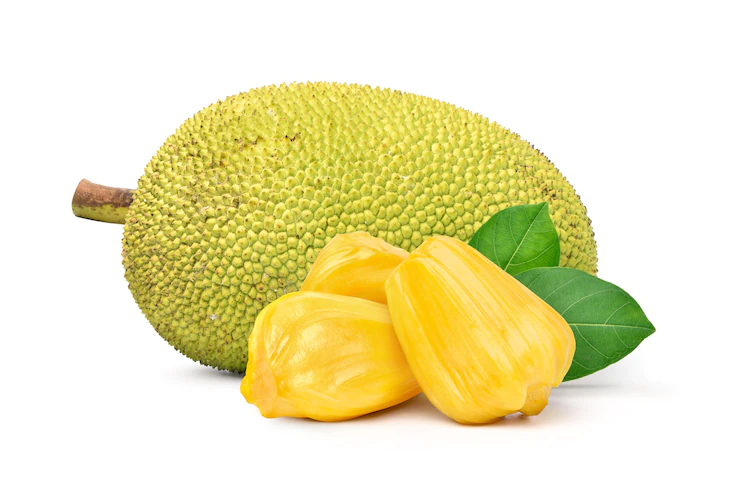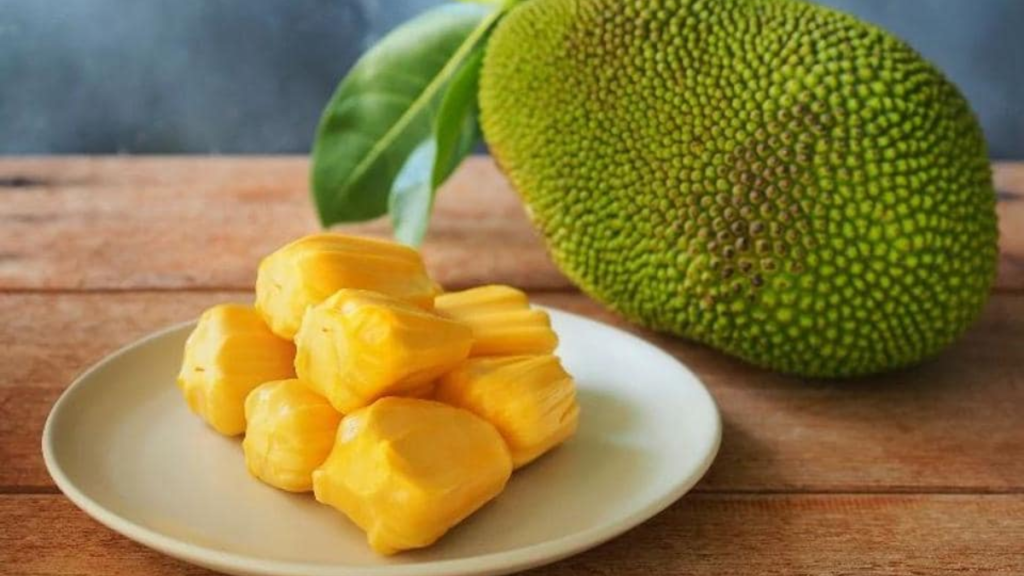The popularity of jackfruit, a unique tropical fruit, has grown in recent years. It has a unique sweetness and may be utilized in several cuisines. In this article, you will get all the crucial information about Jackfruit Nutrition Facts. It’s also high in nutrients and may provide various health benefits.
It has a modest calorie content, with 155 calories per one-cup (100-gram) portion. Carbohydrates 39.6 grams, with protein and a minor fat accounting for the rest. Furthermore, jackfruit provides a good amount of fiber and practically every vitamin and mineral your body needs.

Jackfruit Nutrition Facts
Here is a table of Jackfruit Nutrition Facts based on 100 grams per serving and the percent daily values based on a 2,000-calorie diet:
| Nutrient | Amount per 100g | % Daily Value* |
| Calories | 95 | 5% |
| Total Fat | 0.6g | 1% |
| Saturated Fat | 0.2g | 1% |
| Trans Fat | 0g | – |
| Cholesterol | 0mg | 0% |
| Sodium | 3mg | 0% |
| Total Carbohydrate | 23g | 8% |
| Dietary Fiber | 1.5g | 6% |
| Sugars | 19g | – |
| Protein | 1.7g | 3% |
| Vitamin D | 0mcg | 0% |
| Calcium | 34mg | 3% |
| Iron | 0.6mg | 3% |
| Potassium | 448mg | 10% |
| Vitamin A | 2mcg | 0% |
| Vitamin C | 13.8mg | 15% |
Note: *Percent Daily Values are based on a 2,000-calorie diet. Your daily values may be higher or lower depending on your calorie needs.
What is Jackfruit?
Jackfruit is a tropical fruit that is produced all over the world. It’s a South Indian native. It belongs to the Moraceae family of plants, including fig, mulberry, and breadfruit. Jackfruit is a green or yellow fruit with spiky outer skin. The relatively big size of the jackfruit is one of its distinguishing features.
It is the world’s largest tree fruit, weighing up to 80 pounds (35 kilograms). The flavor of jackfruit is sweet and delicious. It is supposed to taste like a combination of fruits such as apples, pineapples, mangoes, and bananas.
Because of its texture, similar to shredded flesh, vegans and vegetarians frequently utilize this fruit as a meat substitute. Because jackfruit can tolerate tropical climes, it can be a significant source of calories and carbohydrates for individuals in underdeveloped countries who are on the verge of becoming hungry.
Jackfruit is becoming more readily available in other parts, including the United States, despite its tropical origins. During the summer, it is in season. The flesh, or fruit pods, of jackfruit, is the most widely consumed component, palatable both ripe and unripe. It works well in sweet and savory recipes, including sweets and curries. It is also safe to eat the seeds.
What are the Benefits of Eating Jackfruit?
Many critical nutrients are included in jackfruit, which helps us stay healthy. When you add jackfruit to your diet, you give your body the building blocks to feeling good and age gracefully.
Supports Heart Health
Jackfruit is low in saturated fat and high in fiber, making it a good fit for the American Heart Association’s dietary guidelines. According to the organization, consuming a high-fiber diet can help decrease cholesterol levels by 10%.
If you have high cholesterol, jackfruit should be on your shopping list. Jackfruit’s potassium helps keep blood pressure in check, lowering the chance of a heart attack or stroke.
In addition, antioxidants found in fruits and vegetables have been linked to a reduced risk of heart disease. The vitamin C content of jackfruit, in particular, may aid in avoiding plaque instability in atherosclerosis.
Enhances Immunity
The vitamin C in jackfruit also helps the body absorb other essential nutrients like iron and boosts the immune system. Vitamin C supplementation benefits people exposed to cigarette smoke, excessive physical exertion, or freezing temperatures.
It has been demonstrated to reduce common cold incidence by up to 50% in specific populations. Vitamin C is also a precursor of collagen, an essential component of wound healing. Jacalin is a protein found in jackfruit seeds, and Jacalin is a kind of lectin that binds to carbohydrates.
May Improve Sleep
Including extra magnesium in your diet may improve sleep quality and a lower prevalence of insomnia, especially in older persons more susceptible to magnesium insufficiency.
Magnesium is found in roughly 48mg per serving of jackfruit, and magnesium is indicated in amounts ranging from 300 to 350 milligrams per day. Although one cup of jackfruit won’t get you to your daily goal on its own, it can help you get there.
Strengthens Bones
Manganese is a micronutrient that is required for bone development. Higher serum manganese levels were positively linked with bone mineral density and a lower incidence of fractures in postmenopausal women studies.
Manganese is found in 0.07 milligrams per cup of jackfruit. This may not sound like much, but jackfruit is a good source of manganese, mainly because the recommended daily manganese consumption for people is only 1.8 to 2.3 milligrams.
Lowers Risk of Type 2 Diabetes
On occasion, substituting jackfruit for meat is an excellent strategy to reduce calories and saturated fat while increasing fiber and essential minerals. Insulin sensitivity has been linked to consuming less saturated fat and more fiber, and this dietary change can lower the risk of type 2 diabetes.
How to Eat Jackfruit?
Jackfruit is a versatile fruit that can be consumed raw or cooked. Slice it in half and remove the golden fruit pods and seeds from the skin and core before preparing it.
You can use a knife or your hands to do this. It’s worth noting that the white, fibrous section of the jackfruit is quite sticky, and therefore wearing gloves while handling it is recommended. Jackfruit can be eaten raw or cooked in both sweet and savory meals depending on its ripeness.
The unripe fruit is better used in savory dishes, while the ripe fruit’s sweetness is ideal for desserts. Fresh jackfruit can be challenging in grocery shops because it is an exotic fruit, especially out of season. It is, however, frequently marketed in canned form, which is a practical option.
Because of its texture, jackfruit is frequently used as a meat substitute by vegetarians and vegans. Cooking the fruit and then combining it with veggies and seasonings, for example, can be used as a meat substitute in jackfruit tacos.
Additionally, jackfruit can be used in curries and soups. When added to yogurt or oatmeal, the ripe fruit is also delicious. Jackfruit seeds are also tasty, and they can be roasted or boiled, then seasoned as desired. You can even make hummus with the seeds.
How to Store Jackfruit?
Choose jackfruit that isn’t bruised, like you would any other vegetable. Before cutting fresh jackfruit, please wash your hands and rinse it under running water.
After cutting the jackfruit, keep it refrigerated and away from any raw animal products. Cut jackfruit will last three to five days in the refrigerator.
What are the Disadvantages of Eating Jackfruit?
Although jackfruit is generally harmless, certain people may need to limit or avoid it. It causes allergies in certain people, particularly those allergic to birch pollen. Furthermore, because it can reduce blood sugar levels, people with diabetes may need to adjust their prescription dosages if they consume this fruit regularly.
Nonetheless, there have never been any significant side effects associated with eating jackfruit, and it is considered safe for most people to consume. According to some experts, compounds in jackfruit may interact with drugs used after surgery, causing you to become exhausted. If you’re about to have surgery, it’s better to avoid jackfruit or ask your doctor before eating it.
Conclusion
Jackfruit is beneficial to your health for a variety of reasons. It’s abundant in nutrients and antioxidants, and it could help with a variety of health issues, including blood sugar regulation. Eat jackfruit simply or in various ways to incorporate it into your diet.
It’s a great meat substitute in vegetarian and vegan cooking. Fresh jackfruit is easier to come by during the summer months, although canned jackfruit is available year-round at most grocery shops. Adding jackfruit to your diet is a good idea because it is a healthy and unusual meal to explore.
You can eat canned or frozen jackfruit any time of the year, and in the U.S., you are most likely to find it prepackaged in the refrigerated section of the supermarket. Depending on the variety, fresh jackfruit is in season between early summer (May/June) through September and October. Because ripe jackfruits can have an objectionable odor, it’s recommended to eat jackfruit when it is fully grown but before it is ripe.

